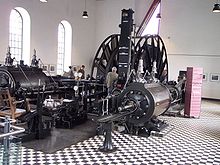Technological change
Technological change is when the use of technology in a society or culture changes over time. This process is also knwon as technological development. Speaking from the point of view of economics, technological change makes it possible to get more output with the same input, or to get the same output, with less input. Often, technological change also affects the quality of the product, which improves over time. As an example, the development of the steam engine was linked to the industrial revolution:. Technological change also affect society: Often, society changes as a result of technological change. To stay with the example of the industrial revolution: In the industrial revolution, many factories were built, and people who worked in these factorires were needed. The work of the factory worker was very different from the work people did before. A whole social class of factory workers developed. As technolgoical change improves efficiencvy, very ofren, it is also linked to unemployment: Fewer people are needed to produce the same output, so some are laid off.

According to Joseph Schumpeter, there are five different types of technological development:
- The launch of a new product
- The introduction of a new production method
- A new market becomes accessible, or is created
- A new source is made available for the componewnts or parts of a product
- A new form of organizazing a company is introduced
Studies have been done on people living in close contact with nature (sometimes called indigenous societies): Very often these people developed complex systems to keep traditions alive, and to avoid technological change if it isn't necessary. Claude Lévi-Strauss used the term "cold cultures" to describe this phenomenon.
Criticism
changePeople have also criticized technological change: Jean-Jacques Rousseau published a work called Discourse on the Origin and Basis of Inequality Among Men in 1755. In it, he writes that before the Industrial Revolution, people were able to live happily, in a state of nature. In it, he also says that private property leads to inequality among humans. At the beginning of the 19th century, the Luddites were opposed to certain technological changes introduced by the Industrial Revolution. In 1968, philiopsphers of the Frankfurt School become critical of technolhical change. In his encyclical Laudato si' Pope Francis has an ambivalent position as to technology: He sees technology as a key contributor to the environmental crisis and human suffering.
Pope Francis points out, that technology is viewed as "principal key to the meaning of existence" and asks the world to "resist" the "assault" of the technocratic paradigm.
"The technocratic paradigm has become so dominant that it would be difficult to do without its resources and even more difficult to utilize them without being dominated by their internal logic. It has become countercultural to choose a lifestyle whose goals are even partly independent of technology… Technology tends to absorb everything into its ironclad logic, and those who are surrounded with technology 'know full well that it moves forward in the final analysis neither for profit nor for the well-being of the human race.'"[1]